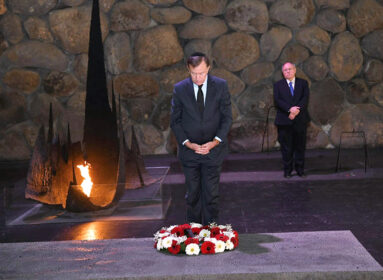In 1985, actor and playwright Mark Harelik set out to tell the story of his Jewish immigrant grandfather, Haskel Harelik, who in 1909 fled the pogroms in Czarist Russia with his wife Leah, and made his way to America. After arriving in – of all places – Galveston, Texas, the Hareliks settled in the tiny Baptist community of Hamilton. They were the town’s only Jews.
Haskel and Leah came to Texas as part of the Galveston Plan, a project that aimed to divert European Jews immigrating to the United States from the large eastern ports of the United States to the southwestern states. The plan ultimately failed, but it did manage to settle 10,000 immigrants before it ceased operations at the outbreak of World War I.
In 2000, Harelik teamed up with composer Steven M. Alper and lyricist Sarah Knapp to transform “The Immigrant” into a musical that the Wall Street Journal/Zagat described as “Everything a musical should be.” The four-person musical has received two Drama Desk nominations for Outstanding Book of a Musical and Outstanding Orchestrations.
On March 21, “The Immigrant” will open at Seven Angels Theatre in Waterbury, where it will run through April 21.
The Ledger spoke recently with Alper and Knapp, who are married, from their home in Lake Peeksville in upstate New York about the creation of “The Immigrants” and the message it carries for all immigrants seeking the American Dream.
Q: Tell us a little bit about your background?
KNAPP: I came to New York from the Panama Canal Zone at the age of 17 to attend the American Academy of Dramatic Arts in Manhattan to study to become an actress, which I did and still do. I met Steven doing “Dames at Sea” at a dinner theater in Tampa, Florida many moons ago. He was the show’s musical director. Five years later we were married – but we started collaborating well before that. Our first full-length, fully produced musical was called “The Library.” I wrote the book and lyrics; Steven the music. We got an NEA [National Endowment of the Arts] grant for it and it was workshopped at the New Harmony Project in Indiana. The New Harmony Project is a writer’s workshop – it’s a wonderful environment for writers to workshop pieces; they do everything from film to musicals to different kinds of theater.
ALPER: I grew up on Long Island – no place as exotic as Sarah – and I studied composition at SUNY [State University of New York] Stonybrook and Mannes College in New York. I was struggling as a music director when I ended up in Florida in the same show as Sarah. When we got back I continued to struggle as a music director, but then broke through, working as a music director, vocal arranger, orchestra coordinator…just about anything musical.
KNAPP: ‘Musical handyman’ we used to call him.
ALPER: That’s right. I did some teaching at the musical theater conservatory that was part of [New York University’s] Tisch School of the Arts actors training programs. Their contract was later given to an organization called CAP21 [a New York City based musical theater training conservatory]. CAP21 ended up being the first to develop “The Immigrant.” I taught there and through that I was asked to write a book, which I did. The book is called Next! Auditioning for the Musical Theater.
Q: How did you come to collaborate with Mark Harelik?
ALPER: We were in New Harmony working on some other projects, and Mark was there working on a sequel to “The Immigrant.” One night we were all walking back to our rooms after dinner, and many members of the community knew that we were struggling to come up with ideas for a project. We were discussing between ourselves what we might do.
KNAPP: Mark was behind us and overheard our conversation and he said to us, “How about my play, The Immigrant?” I must have been the only person in America who had not seen that play because it was actually the most produced play in America in 1991. And I said “Let me read it.” He had a copy and I read it and I said “Yes, let’s do this. This is fantastic.”
Q: Do you relate to the story in any way to the story of “The Immigrant”? And, is it important to relate to the story if you’re going to write the music?
ALPER: Well, you live with a project for so long that it really is important to relate to it. This is one of the reasons we struggle with ideas. The knowledge that you’re going to live with this for five, seven, fifteen years…
KNAPP: Absolutely. You really have to relate and like and find fascinating your material – whatever it is you’re working on. This particular story is I think, universal. The power of it is that it appeals to everybody. Mark often says that when he was doing the play he’d have people come up
to him – Koreans, Germans, Chinese, Italians – and they would say ‘this is my family’s story.’ It’s not necessarily just the Jewish story, it can be anyone’s story.
Q: Is it the immigrant experience that people find so easy to relate to?
KNAPP: Yes. It’s the story of hope and community and loss; the struggle to fit in; It’s a universal story of neighbors and family and faith.
Q: Is it difficult to write a musical that’s already been staged as a play?
KNAPP: Well, in this instance it went very well. One of the reasons was that Mark was so enthusiastic and loved the way it was going every step of the way, so we didn’t have an author who turned his nose up at what was happening.
When I read the play for the first time I noted those places that I where I thought a song should be — and those were the places where the songs are. It was so clear to me. Also, Mark’s beautiful language was a jumping off point for many of the lyrics, so I just mined his language for the lyrics and they truly sing.
ALPER: Also, translating an existing stage play into musical has a lot of benefits in the fact that the playwright has solved, or may have solved, a lot of issues that you would come up against. For instance, how to show scenes of battle or how to stage a car crash. The playwright has already resolved those issues.
Q: Has the story changed at all from the play to the musical?
KNAPP: Well, in the stage play there is a narrator and we’ve done away with that – but the story is the same. We’ve stayed very, very close to the original play. The musical still has four characters – we call it a chamber musical.
ALPER: It’s hard to change the story when the librettist is the grandson of the main character!
For more information on “The Immigrant” at the Seven Angels Theatre call (203) 757-4676 or visit www.sevenangelstheatre.org.







 Southern New England Jewish Ledger
Southern New England Jewish Ledger















